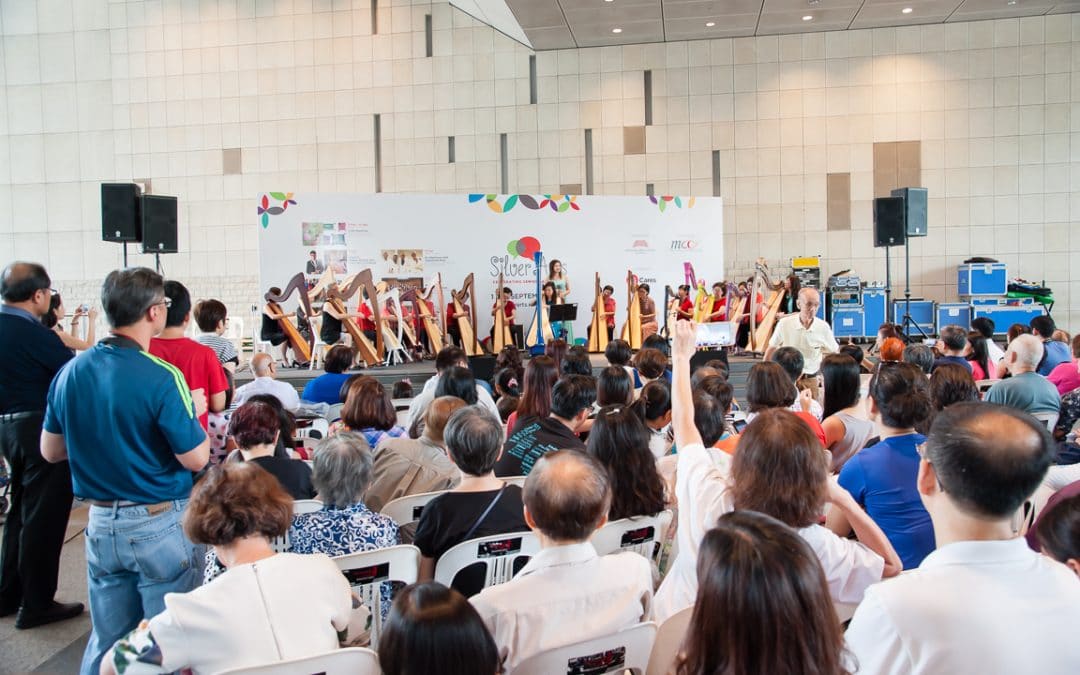Four ways to give back through the arts


To put things into perspective: giving to the arts means more than just supporting a company’s artistic endeavours – support for the arts helps build a more inclusive society and brings benefits to the community in many ways.
Many of Singapore’s artists, art companies and institutions are passionate about social causes, and make it part of their mission to give back through the work they do. These efforts often go beyond cultivating art appreciation, to include efforts to reach out to the less privileged, nurture the young and bring the joy of the arts to a wider audience.
To help navigate the dynamic field of the arts, we have identified key areas in which the arts is making strides within the local community:
Arts education
An arts education is considered vital in helping children develop creativity and imagination – key skills to thrive in the future economy. These efforts can be bolstered by supporting spaces for early arts exposure, such as the Keppel Centre for Art Education at the National Gallery Singapore, or access to dedicated arts training and programmes as exemplified by The Rice Company, Art Outreach Singapore and Playeum.
Alongside their artistic season, many local arts companies have also developed outreach programmes for children and youths, including Singapore Repertory Theatre, The Necessary Stage, Odyssey Dance Theatre, The Fingers Players, The Theatre Practice, TheatreWorks and Temenggong Artists-In-Residence.
Active aging
Empowering our seniors to lead meaningful, active lives is a priority for Singapore, and the arts can play a significant role. Events such as the National Arts Council’s Silver Arts Festival have demonstrated how the arts offer seniors a safe space to try new activities, and also a platform to engage their minds through enjoying a performance or work of art, as exemplified by Beautiful Mind Charity which runs free concerts at various elderly homes. The Singapore Chinese Orchestra plays to patients and healthcare workers in hospitals and care centres through its ‘Caring Series’ to provide the healing touch through music.
Others like contemporary dance outfit The Arts Fission Company have channelled art towards practical benefits. The company runs Everyday Waltzes for Active Aging, a programme which utilises movement to help the elderly maintain strong core muscles and reduce their risk of falling.
Mental health
In some instances, the arts contributes to the mental health of different segments of our society by helping to recognise and bring deep issues to light. Take for instance theatre company Drama Box, which develops theatrical work mirroring our social fabric. The company has worked with many marginalised and underserved groups, including migrant workers, out-of-school youths and the elderly, and continues to use theatre to explore important social issues from mental health, dying, resilience and identity.
Special needs
The arts celebrates the value of every human being, making it a natural fit when it comes to engaging individuals with special needs and disabilities. Superhero Me, a ground-up inclusive arts movement turned charity, has been championing the power of art to bring joy and empowerment to children from needy families and those with special needs.
Arts companies can also use their expertise to give back. Contemporary dance company RAW Moves runs A Little RAW, an inclusive children’s dance company bringing dance to children with special needs, while Beautiful Mind Charity has been offering free professional music education to children with disabilities since 2014.
Photo: National Arts Council
To put things into perspective: giving to the arts means more than just supporting a company’s artistic endeavours – support for the arts helps build a more inclusive society and brings benefits to the community in many ways.
Many of Singapore’s artists, art companies and institutions are passionate about social causes, and make it part of their mission to give back through the work they do. These efforts often go beyond cultivating art appreciation, to include efforts to reach out to the less privileged, nurture the young and bring the joy of the arts to a wider audience.
To help navigate the dynamic field of the arts, we have identified key areas in which the arts is making strides within the local community:
Arts education
An arts education is considered vital in helping children develop creativity and imagination – key skills to thrive in the future economy. These efforts can be bolstered by supporting spaces for early arts exposure, such as the Keppel Centre for Art Education at the National Gallery Singapore, or access to dedicated arts training and programmes as exemplified by The Rice Company, Art Outreach Singapore and Playeum.
Alongside their artistic season, many local arts companies have also developed outreach programmes for children and youths, including Singapore Repertory Theatre, The Necessary Stage, Odyssey Dance Theatre, The Fingers Players, The Theatre Practice, TheatreWorks and Temenggong Artists-In-Residence.
Active aging
Empowering our seniors to lead meaningful, active lives is a priority for Singapore, and the arts can play a significant role. Events such as the National Arts Council’s Silver Arts Festival have demonstrated how the arts offer seniors a safe space to try new activities, and also a platform to engage their minds through enjoying a performance or work of art, as exemplified by Beautiful Mind Charity which runs free concerts at various elderly homes. The Singapore Chinese Orchestra plays to patients and healthcare workers in hospitals and care centres through its ‘Caring Series’ to provide the healing touch through music.
Others like contemporary dance outfit The Arts Fission Company have channelled art towards practical benefits. The company runs Everyday Waltzes for Active Aging, a programme which utilises movement to help the elderly maintain strong core muscles and reduce their risk of falling.
Mental health
In some instances, the arts contributes to the mental health of different segments of our society by helping to recognise and bring deep issues to light. Take for instance theatre company Drama Box, which develops theatrical work mirroring our social fabric. The company has worked with many marginalised and underserved groups, including migrant workers, out-of-school youths and the elderly, and continues to use theatre to explore important social issues from mental health, dying, resilience and identity.
Special needs
The arts celebrates the value of every human being, making it a natural fit when it comes to engaging individuals with special needs and disabilities. Superhero Me, a ground-up inclusive arts movement turned charity, has been championing the power of art to bring joy and empowerment to children from needy families and those with special needs.
Arts companies can also use their expertise to give back. Contemporary dance company RAW Moves runs A Little RAW, an inclusive children’s dance company bringing dance to children with special needs, while Beautiful Mind Charity has been offering free professional music education to children with disabilities since 2014.
Photo: National Arts Council
- Related Topics For You: ACCESSING QUALITY EDUCATION, ARTS & HERITAGE, CHARITY STORIES, CHILDREN, EDUCATION, HEALTH, INCLUSIVITY & INTEGRATION, MENTAL WELLBEING, OPINION, PERSONS WITH DISABILITIES, SENIORS, STORIES OF IMPACT, YOUTH



